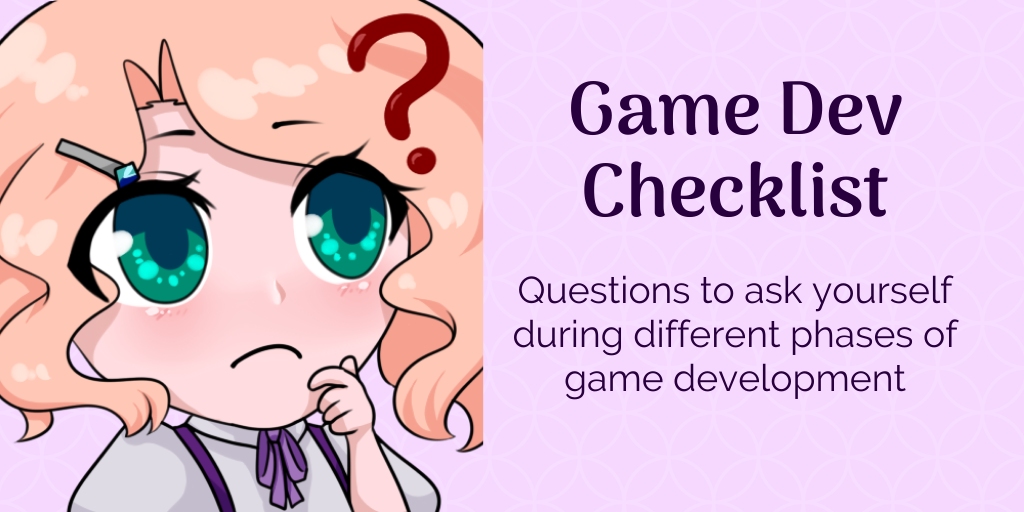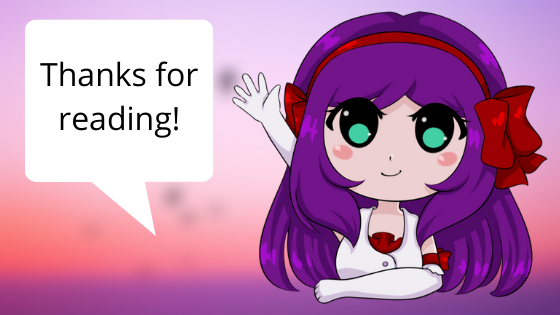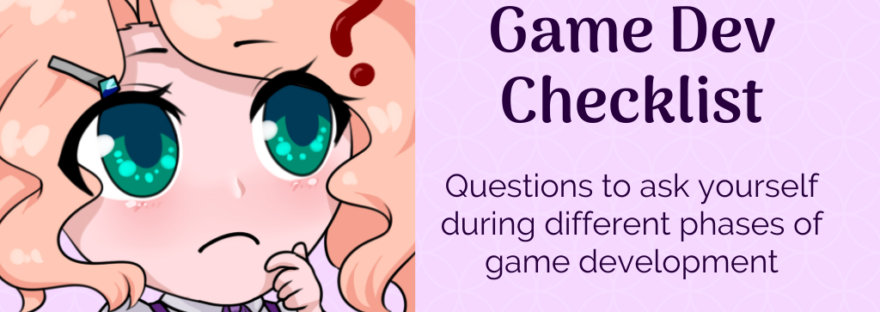Often when developing games we find ourselves in a bubble of development. We trick ourselves into thinking things are set in stone when they aren’t. We start believing that we have to do things a certain way. Everyone does it eventually. So I created a series of questions to ask yourself while in different stages of development. Did I miss any important ones? Send them to me on Twitter or Discord!

Before Starting a Game
What genre(s) will this be?
These might change as the game and story develops, but try to have an idea of what you’d like the genres to be in the beginning.
What’s the core mechanics?
Establish core mechanics early. This guides you towards what engine you’ll want to use- different engines are better for different mechanics.
How long will the game be?
Obviously you won’t know for certain what the scope of the project will be upfront, but try to estimate it. Outline it on pen and paper, get a general feel for it. Will it be 2 hours? 10 hours? 30? Will it have only a handful of characters or 20+? How many levels are you thinking of?
Will it be commercial?
As soon as you have an idea, set this part in stone. Don’t change it later on unless you’re absolutely certain. Making a free game is extremely different than a commercial one. When you decide to charge for your game, you have to worry about licensing fees, marketing, paying teammates, taxes, distribution, etc.
It’s a lot easier to turn a commercial game in progress free / freemium than turning a free game in progress commercial.
Will I need funding?
Similar to figuring out if the game will be free or paid, you should figure out very early on how development will be paid for. Will it be all volunteer? Revshare? Maybe you’ll seek crowdfunding like Kickstarter or Indiegogo once you have a demo done? Or maybe you’ll self fund the game? Will you seek investors or business grants? There’s a lot of ways to fund a game.
Side note: check out my talk here on getting business grants for game studios.
Will I need help making this?
Again, just like with the previous question, you’ll need to figure this out very soon. Can you do it all on your own, or at least learn how to? Is the scope too big for one person to feasibly make? Do you want to just focus on some areas?
During Development
Focus- how can I get this game from concept to final product?
Is the scope too large for my team?
Reevaluate the scope at every stage of development, at every team meeting. An overgrown scope is one of the most silent and deadliest killers for projects. Talk things out with your teammates or with friends, if you’re working alone.
Do we really need this feature?
Evaluating scope can be hard- so here’s some pointers! Go through your features list (including mechanics, levels, abilities, etc.) and ask which ones you actually need.
Who is doing what?
Define jobs not only by titles but also by outlining what they’ll be doing. One person might think an editor should proofread and rearrange sentence structures while another person might think they should just read through it for consistency. I’ve had people not know that a marketer should have access to basic assets for the game like summaries, character art, screenshots, etc.
Be clear both in the hiring / volunteering stage and once they start on what you expect from them. Will your PR person be responsible for managing social media, sending newsletters, contacting press, or doing community management? Will your artist do just background linearts, character art, GUI, or something else? Set these mostly in stone quick and make sure they’re clear.
How often will I communicate with my team (and where)?
If you’re not going solo, how will you talk to your teammates? Where will you have meetings and how frequently will they be? Keep in mind that meetings should be both updates on progress and planning ahead. Check in on your teammates to see how they’re doing and take notes of anything that might hurt future progress (like excusing a lack of progress on the same thing over and over such as school).
What platforms will we release on?
Nowadays it’s not too hard to change ports after the game is near finished or finished, but it’s still good to plan ahead. Will you release on just Steam & Itch.io or will you go for mobile as well? Google Play is a one-time $25 fee, Amazon is free, and the Apple App Store is $100 yearly. Does you engine support console ports if you choose to go to console?
Where will you post updates?
Where will people be able to see updates for you game? Will it mostly be through a website, a Twitter account, a Discord server, a newsletter, or something else? How often will you be able to post updates so you don’t go months without any news?
Who is the target audience for this?
First off: your target audience/market is not everyone.
Your target audience is the niche that will most likely love your game. The target market for a $30 otome on Steam is not going to be men in their 30s who play FPS games- it’s most likely going to be women in their 20-30s who play games on Steam and like romance visual novels. This of course is just an example and not a refined target audience. Your actual target market should be more specific- age range, gender, disposable income, platforms, aesthetics, preferred social media, etc.
When you think you have it figured out, test it! Go to where these players are, do some research on similar games and ask around. Ask who’d be interested in your game. Research, research, research!
When should I announce the game?
Once you announce a game you’re kickstarting the marketing process. If you announce too early then you’ll run out of updates and progress to show or features will change during development and you’ll have to pivot the marketing. If you announce too late then you might run out of time to grow awareness of the product before launch- and launch is a very big day nowadays.
You should feel comfortable with the idea of the project and have a fair amount of progress built up with a steady stream of more assets to come in the future. Have a clear logline and know what the core of the project is about. Don’t show everything on announcement day, save some for the next week and such.
And when you announce a game, make sure you have a marketing funnel to bring players in!
How long will the project take?
If you think a project will take you a year, plan for two. If you think a project will take you two months but you don’t cut back on scope at all… plan for a year. It can be hard to envision how long a project will take when you’re first starting out, but this becomes easier with each release as you gain experience.
Near Release
Caution- the end is in sight but don’t lose focus just yet.
Do we have enough wishlists and interest?
If you’re releasing on Steam then wishlists are a good indicator of how well the game will sell. Are there enough eyes on your game that it should sell well?
Has the game been playtested enough?
Be honest with yourself- has the game been tested thoroughly? Have you received enough feedback from players and fixed any issues? Are there any areas that still need some work?
Do I have to release on X day?
Is there something forcing you to release on a certain day, or do you have tunnel vision after a long road of development? Sit back and really think about if your game is ready to launch- you can’t fix a bad launch day. I’ve learned this the hard way- don’t force yourself into thinking you have to launch if there’s nothing forcing you to. Get those extra eyes on your game, ask for more feedback, type up a few more press emails, etc.
What does my pre-launch & launch campaign look like?
How does your marketing plan look leading up to launch? What am I going to do on launch day? Plan these things out in advance to save a lot of headache.
Do I have all of my credits in order?
Check back over your list of team members or anyone you have to credit for creative commons assets and such.
Post Release
Reflect- what went wrong and what went right?
What are some things I could have improved?
Get some feedback from early adopters and make a mental (or physical) list of notes. What are some things that need updating right now? What are some things that I could have improved in the game as a whole? How can I improve future games with my new experience?
Did I get the right target audience?
Was your marketing spot on or was it off to the side a bit? Reflect on how your marketing was- were you not posting enough to social media? Did you contact enough press, or did you contact them too late? Was your call to action in your demo strong? Did you even have an effective call to action?
What’s next?
This is completely up to you. Do you already have an idea for your next game? Are you done making games? Will you make a bigger or smaller game next time?
I hope this sorta-article helps you think about some things in game dev you weren’t currently conscious of. Reframing our view and making sure we’re on track is an important part of making anything.
If you liked this post, consider checking out my other articles, I like to write about game development philosophies and marketing. You can also talk to me about marketing on Twitter or in my marketing Discord channel here. My visual novel & RPG development studio is Crystal Game Works.
P.S. If you want to use the cute Rimia thinking image as an emoji along with other cute ones, join my studio’s Discord server.

